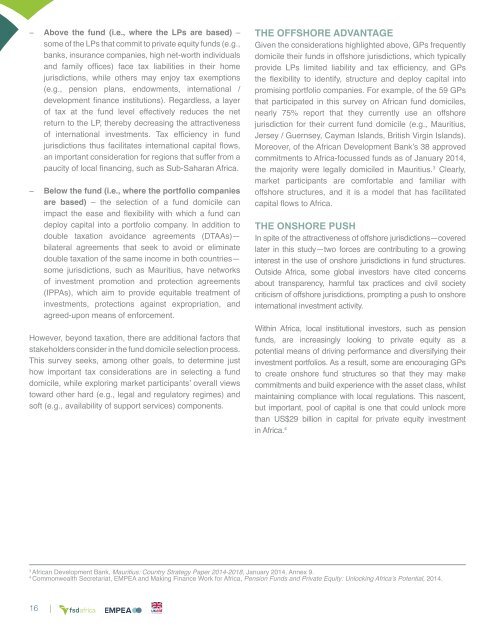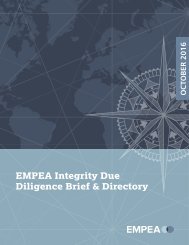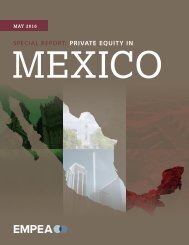You also want an ePaper? Increase the reach of your titles
YUMPU automatically turns print PDFs into web optimized ePapers that Google loves.
− Above the fund (i.e., where the LPs are based) –<br />
some <strong>of</strong> the LPs that commit to private equity funds (e.g.,<br />
banks, insurance companies, high net-worth individuals<br />
and family <strong>of</strong>fices) face tax liabilities in their home<br />
jurisdictions, while others may enjoy tax exemptions<br />
(e.g., pension plans, endowments, international /<br />
development finance institutions). Regardless, a layer<br />
<strong>of</strong> tax at the fund level effectively reduces the net<br />
return to the LP, thereby decreasing the attractiveness<br />
<strong>of</strong> international investments. Tax efficiency in fund<br />
jurisdictions thus facilitates international capital flows,<br />
an important consideration for regions that suffer from a<br />
paucity <strong>of</strong> local financing, such as Sub-Saharan Africa.<br />
−<br />
Below the fund (i.e., where the portfolio companies<br />
are based) – the selection <strong>of</strong> a fund domicile can<br />
impact the ease and flexibility with which a fund can<br />
deploy capital into a portfolio company. In addition to<br />
double taxation avoidance agreements (DTAAs)—<br />
bilateral agreements that seek to avoid or eliminate<br />
double taxation <strong>of</strong> the same income in both countries—<br />
some jurisdictions, such as Mauritius, have networks<br />
<strong>of</strong> investment promotion and protection agreements<br />
(IPPAs), which aim to provide equitable treatment <strong>of</strong><br />
investments, protections against expropriation, and<br />
agreed-upon means <strong>of</strong> enforcement.<br />
However, beyond taxation, there are additional factors that<br />
stakeholders consider in the fund domicile selection process.<br />
This survey seeks, among other goals, to determine just<br />
how important tax considerations are in selecting a fund<br />
domicile, while exploring market participants’ overall views<br />
toward other hard (e.g., legal and regulatory regimes) and<br />
s<strong>of</strong>t (e.g., availability <strong>of</strong> support services) components.<br />
THE OFFSHORE ADVANTAGE<br />
Given the considerations highlighted above, GPs frequently<br />
domicile their funds in <strong>of</strong>fshore jurisdictions, which typically<br />
provide LPs limited liability and tax efficiency, and GPs<br />
the flexibility to identify, structure and deploy capital into<br />
promising portfolio companies. For example, <strong>of</strong> the 59 GPs<br />
that participated in this survey on African fund domiciles,<br />
nearly 75% report that they currently use an <strong>of</strong>fshore<br />
jurisdiction for their current fund domicile (e.g., Mauritius,<br />
Jersey / Guernsey, Cayman Islands, British Virgin Islands).<br />
Moreover, <strong>of</strong> the African Development Bank’s 38 approved<br />
commitments to Africa-focussed funds as <strong>of</strong> January 2014,<br />
the majority were legally domiciled in Mauritius. 3 Clearly,<br />
market participants are comfortable and familiar with<br />
<strong>of</strong>fshore structures, and it is a model that has facilitated<br />
capital flows to Africa.<br />
THE ONSHORE PUSH<br />
In spite <strong>of</strong> the attractiveness <strong>of</strong> <strong>of</strong>fshore jurisdictions—covered<br />
later in this study—two forces are contributing to a growing<br />
interest in the use <strong>of</strong> onshore jurisdictions in fund structures.<br />
Outside Africa, some global investors have cited concerns<br />
about transparency, harmful tax practices and civil society<br />
criticism <strong>of</strong> <strong>of</strong>fshore jurisdictions, prompting a push to onshore<br />
international investment activity.<br />
Within Africa, local institutional investors, such as pension<br />
funds, are increasingly looking to private equity as a<br />
potential means <strong>of</strong> driving performance and diversifying their<br />
investment portfolios. As a result, some are encouraging GPs<br />
to create onshore fund structures so that they may make<br />
commitments and build experience with the asset class, whilst<br />
maintaining compliance with local regulations. This nascent,<br />
but important, pool <strong>of</strong> capital is one that could unlock more<br />
than US$29 billion in capital for private equity investment<br />
in Africa. 4<br />
3<br />
African Development Bank, Mauritius: Country Strategy Paper 2014-2018, January 2014, Annex 9.<br />
4<br />
Commonwealth Secretariat, EMPEA and Making Finance Work for Africa, Pension Funds and Private Equity: Unlocking Africa’s Potential, 2014.<br />
16 |





